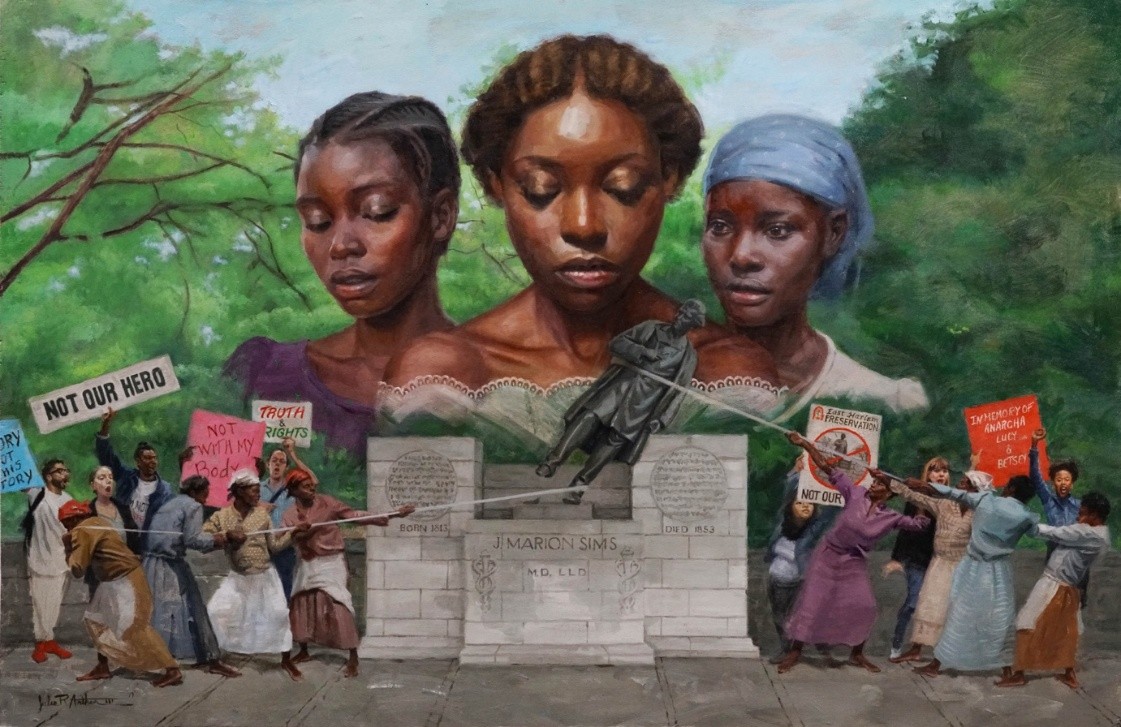Call and Response: A Narrative of Reverence to Our Foremothers in Gynecology
Countway Library is thrilled to announce our newest exhibit, on loan from the Resilient Sisterhood Project!
Exhibit Dates: October 25, 2025-January 21, 2026
Curators: Yasmina Kamal and Lilly Marcelin
Events
- Opening Reception: Saturday, October 25, 3pm
- Artist Talk with Jules Arthur: Tuesday, November 18, 5:30pm
- Closing Ceremony: Wednesday, January 21, 6pm
.png)
Curatorial Statement
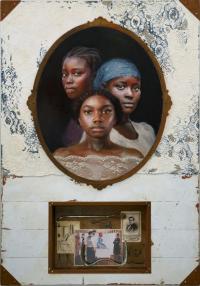
Jules Arthur, 2019
Mixed Media
Property of Resilient Sisterhood Project
The Resilient Sisterhood Project (RSP) proudly presents Call and Response: A Narrative of Reverence to Our Foremothers in Gynecology. Guided by the Sankofa principle of looking to the past to understand the present, this art exhibition raises public awareness about the exploitation of enslaved Black women’s bodies in the founding of modern gynecology as a medical specialty in the United States.
Long lauded as the “father of modern gynecology,” Dr. James Marion Sims conducted inhumane experiments on nearly a dozen enslaved Black women and girls during the 1840s in Montgomery, Alabama. He only spoke and wrote about three of them—Anarcha, Betsey, and Lucy. Dr. Sims performed at least 30 surgeries without anesthesia on Anarcha alone.
In 2010, Lilly Marcelin, Founder and Executive Director of RSP, first learned about the plight of these women and girls while listening to a lecture on Dr. James Marion Sims. She was distraught and wondered why such important history is not widely taught. Many days later, unable to shake the spectrum of emotions stemming from what she learned, Lilly felt a call to action. This was the genesis of Call and Response. In 2017, Lilly was introduced to African American artist Jules Arthur. Because Jules is well-known for his brilliance at capturing complex Black historical narratives, she shared the story with him. He was stunned. From there, the two worked closely to bring the story to light, culminating in this powerful exhibition.
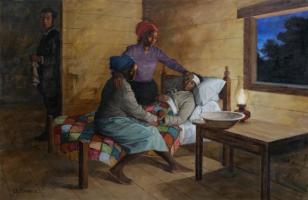
Jules Arthur, 2019
Mixed Media
Property of Resilient Sisterhood Project
Call and Response is a narrative arc. It begins with the poignant portrayals of Anarcha, Betsey, and Lucy, as well as other ancestors. What follows is a condemnation of the complicit roles played by many doctors in upholding the institution of slavery instead of their medical oath. The past and present blend together as the narrative moves into the stories of Black women across generations who became trailblazers in the very fields that viewed them as mere objects of experimentation. While we cannot change history, the exhibited works are part of our call to unearth the past, examine the present, and shape the future of Black women’s reproductive health and rights.
Visit the Exhibit
Open to Harvard ID holders Monday-Friday (building hours)
Open to community members Saturday-Sunday (access policies)
Please join us for an Artist Talk with Jules Arthur on November 18.
To request a group tour (7-20 people), please email The Resilient Sisterhood Project.
Featured Artists
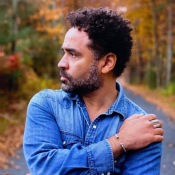 Jules Arthur
Jules Arthur
Born in St. Louis, Missouri, Jules was raised with strong values and a moral sensibility that has become a wellspring source for the insights expressed in his work. With an educational background in visual arts and his studied observations of life, he is able to combine passion and tradition into visual stories of human endeavor. In 1995, he moved to New York City to attend The School of Visual Arts where he received a B.F.A. with honors in 1999. The following year, he was privileged to receive guidance from Robert Blackburn while attending the Robert Blackburn Printmaking Workshop. Since then, he has been the recipient of awards and has been given a commending review in the New York Times for his “deft draftsmanship.” Committed to the path of a lifelong student of life and art, he can be found frequently in continuing course studies at the renowned Art Students League in New York City. He states, “If one is to master the human form one must remain in constant pursuit of it.”
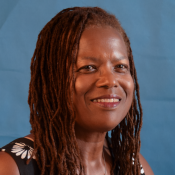 Dr. Michele David
Dr. Michele David
Haitian-born artist Dr. Michele David creates quilts that weave African and Haitian traditions with contemporary themes of resilience, identity, and healing. Infused with bold color, intricate pattern, and layered symbolism, her work carries the cultural legacy of her homeland and her dedication to storytelling through cloth.
Alongside her role as Chief of Clinical Quality and Safety at MIT Health, Dr. David turns to quilting as a parallel practice, where precision and intuition meet. This dialogue between medicine and art allows her to honor the strength and lived experiences of Black women while creating a space for reflection, restoration, and care.
Her quilts have been shown widely across the United States and internationally. She has presented solo exhibitions at the Museum of the National Center of Afro-American Artists in Boston and the Fort Smith Art Center in Arkansas, and her work has appeared in group shows at the New England Quilt Museum, the Texas Quilt Museum, the Museum of Biblical Art in New York, and in The Hague, Netherlands.
Her art has been featured in UU World, Exhale Magazine, and Quilter’s Newsletter, and in books including Migrating Colors: Haitian Arts in New England, Threads of Faith: Recent Works from the Women of Color Quilters Network by Carolyn Mazloomi, I Remember Mama, and Creative Quilting: The Journal Quilt Project by Karey Patterson Bresenhan. She has also been featured on HGTV’s Simply Quilts and PBS’s Nancy’s Corner.
 Kenneth Green
Kenneth Green
Kenneth Green, originally from San Bernardino, California, graduated from the United States International University with a B.F.A. in Musical Theater Dance and an M.A. in Dance from California State University Long Beach. Kenneth served as casting director for Walt Disney World in Orlando, Florida, where he was responsible for identifying and maintaining professional talent for Walt Disney World and their global partners. He has been on faculty at the University of California Irvine, and Spelman College in Atlanta, where he served as Director of Cultural Initiatives in the Office of College Relations. He has staged halftime shows for the Atlanta Falcons and choreographed several productions for Six Flags Over Georgia including their 50th Anniversary Show Celebration. His professional choreography includes City Springs Theatre production of the Color Purple, Target Stores with Vanessa Williams, Adidas, Wendy’s Hamburgers, Kodak and served as TV choreographer for Walt Disney World Christmas Specials and Easter Specials and park parades. Kenneth is currently preparing is his exhibition Clothes Story: Highlighting African American Women’s Stories from 1890-1963 and the clothing they wore to premiere in Spring 2022.
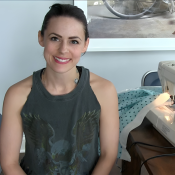 Michelle Hartney
Michelle Hartney
Michelle Hartney is an artist and activist based in Chicago, whose work centers on reproductive justice, gender equity, and healthcare in the United States. Working across mediums such as fiber, ceramics, wood, embroidery, and social practice, she creates projects that confront urgent issues—including obstetric abuse, maternal mortality, postpartum PTSD, gender-affirming care, and the effects of racism and misogyny on maternal health outcomes. Hartney’s practice not only sheds light on these critical topics but also fosters public engagement and encourages advocacy for systemic change.
The Impact
What people are saying about the exhibitionHundreds of visitors have experienced the exhibition during its time at Countway Library. Here's what some of them have shared with us:
"I'm back for a second time to see this powerful exhibit. The renderings are so beautiful and resonate with me as an American descendant of enslaved people. Thank you for elevating the foremothers of gynecology."
"As always, an inspiring exhibition! We need everyone to come see this work."
"I am so grateful for such an exhibition at the medical library. As someone who experienced significant racism and sexism during my residency training by people in positions of power, I am extremely grateful for such efforts to educate the medical community about our true history and create a healthier, more accountable culture."
"Every time I come to the library, I see these images - while difficult to stomach, I'm glad the library has chosen these images. Paired with the clothing of trailblazing Black female doctors, I see how resilient humans can be in the face of incredible cruelty. I leave with the hope that people knowing the true story will stop future crimes and aggressions."
"Thank you for telling the truth."
"The "great man narrative" of Sims MD is relevant today as never before. Thanks for the exhibition."
"The beauty prevails -the spirit propels. Congratulations on your creative spirit."
"I love that this exhibit acknowledges Black women's contributions to medicine and healing."
"Although jarring to happen upon, I'm immensely grateful to see this history being highlighted."
"Being able to understand the untold stories of unjust racist systems gives insight to the bigger picture. Their participation in gyne study will not go unnoticed. #MothersofGyne"
"This is my third time experiencing this exhibit and each time, its scope and power resonate incredibly deeply. Today, something about the clothing replicas helped bring everything to renewed life. As always, I bring deep appreciation and much respect to RSP's determination to speaking truth and honoring forgotten legacies."
"This show and the artist talk blew me away! Thank you for this incredible and timely work."
"Everything resonated with me. As a Black woman, I feel this so deeply knowing that the advancement of medicine couldn't happen without us."
"Just wow. It was disheartening to read what our foresisters of gynecology endured. My heart ached for them, as if I were in the room. As an African American healthcare professional, I'm thankful for their sacrifice and it inspires me to keep on my journey and continue to trailblaze and stay represent my lineage. I won't forget these women, their sacrifice, their strength."
"Every life is precious, deserved to be treated with dignity, respect, and as embodiment of one's self to be guided by principles of morality, ethics and principles of selflessness with saying you are me, and I am you."
"Currently going through this exhibition for class; it is incredibly powerful! Thank you for documenting this important story and letting this injustice be known. As a Black woman studying at Harvard, I am incredibly touched and I appreciate these stories being spared in a space like this."
"Thank you RSP for making these stories visible."
"As an Indian whose grandparents suffered similar torture by the British and who heard all the facts during colonization, I can very much relate to the suffering of Black people in the US."
"Intergenerational pain and wisdom is so beautifully captured in this art. Remembrance is important in recognizing where we are today and how we can influence the future. Thank you for this reminder."
"I came here to kill some time while I was just starting my 3A week induction at Brigham and Women's around the corner. There, I feel so safe, comfortable, protected, and in great part because it is considered one of the best OBGYN hospitals in the country. How meaningful to stumble upon this exhibit. To know who made my excellent care possible. I hear these women and their struggle. This brings so much intention to my upcoming labor and delivery. Thank you for bringing this to light!"
"Such a powerful telling of a shameful past through so many art media. Thank you for sharing the stories and art."
"I came to this exhibition by invitation and spent almost an hour listening to the person responsible for this exhibition - Lilly. I felt the energy in her around how this exhibition came about. Such background gave me a vantage point to appreciate the essence of the artwork. These are stories that must be told and must be heard. Only then can we heal and start to respect all forms of life. Thank you Lilly for bringing this story to light!"
"My heart leapt and the tears flowed as I viewed the exhibit. I had the same reaction after reading (and during the reading) of "Say Anarcha," the book by Hallman. I stand here as a Black woman MD in awe of how the women, Lucy, Anarcha and Betsey, were able to stand the assault and degradation."
"Thank you for this exhibit!"
About the Resilient Sisterhood Project

The Resilient Sisterhood Project (RSP), founded in 2012, is a non-profit based in Boston raising awareness and empowering women and young adults of African descent affected by diseases of the reproductive system.
RSP works in partnership with—rather than on behalf of—black women and young adults in our communities as we mobilize to address deeply-rooted racial discrimination and internalized racism, health and medical inequities, oppressive cultural and gender norms, environmental and food injustice, and other social determinants of health that perpetuate the silence, secrecy, and inaction surrounding these diseases. We make a conscious decision to bring a unique social and cultural approach to the discourse of these diseases.
Our educational programs represent a venue of support for advocacy, activism, and empowerment. We organize both structured and informal dialogue to provide a culturally sensitive safe space where women of African descent can speak freely and gain knowledge about their reproductive health.
RSP brings an expansive definition to and understanding of the word “women” to include transgender women, cisgender women, gender queer, and gender non-conforming people who have a female reproductive system.
A Call to Action
Artist Michelle Hartney, whose work is included in the “Call & Response” exhibition, urges audiences to take decisive action by pursuing their own corrective measures towards amending J. Marion Sims’s cruel legacy.
Step 1: Visit Hartney’s website, Correcting History, and download her customized bookmark which highlights Sims’s surgeries on enslaved Black women.
Step 2: View the list of medical publications that are still in circulation.
Step 3: Access a map of the United States and click on your individual state. From there you will gain access to a list of academic institutions which may carry the publications listed in Step 2.
Step 4: If you have access to these libraries, via your academic affiliation, visit these institutions and surreptitiously insert the bookmarks into the publications that mention J. Marion Sims or vesicovaginal fistulas.
Step 5: Take a photo of your “corrected” book and share with michellehartneyart on Instagram, mmkhartney on Twitter, or Michelle Hartney on Facebook to get more folks involved using the hashtags #correctinghistory #callandresponse #lucybetseyanarcha #countwaylibrary.
Further Reading
We invite you to explore this list of recommended readings, compiled by the Hutchins Center for African and African American Research.
Books
- Black and Blue by John Hoberman
- Killing the Black Body by Dorothy Roberts
- Medicine and Slavery: The Diseases and Health Care of Blacks in Antebellum Virginia by Todd L. Savitt
- Body and Soul: The Black Panther Party and the Fight Against Medical Discrimination by Alondra Nelson
- Fatal Invention: How Science, Politics, and Big Business Recreate Race in the Twenty First Century by Dorothy Roberts
- Superior: The Return of Race and Science by Angela Saini
- Is Science Racist? Debating Race by Jonathan Marks
- The Troubled Dream of Genetic Medicine by Keith Wailoo and Stephen Pemberton
- Under the Skin: The Hidden Toll of Racism on Health in America by Linda Villarosa
- Medical Bondage: Race, Gender, and the Origins of American Gynecology by Deirdre Cooper Owens
- Medical Apartheid: The Dark History of Medical Experimentation on Black Americans from Colonial Times to the Present by Harriet A. Washington
- The Pain Gap: How Sexism and Racism, in Healthcare Kill Women by Anushay Hossain
- Henrietta Lacks, The Untold Story by Ron Lacks
- The Immortal Life of Henrietta Lacks by Rebecca Skloot
- Examining Tuskegee: The Infamous Syphilis Study and Its Legacy by Susan Reverby
- Acres of Skin: Human Experiments at Holmesburg Prison by Allen M. Hornblum
- Scenes of Subjection: Terror, Slavery, and Self-Making in Nineteenth-Century America by Saidiya Hartman
- Soul by Soul: Life Inside the Antebellum Slave Market by Walter Johnson
- In the Wake: On Blackness and Being by Christina Sharpe
Documentary Films
- Remembering Anarcha directed by Josh Carples, 2021
- Aftershock directed by Paula Eiselt and Tonya Lewis Lee, 2022
News Articles
- Why Are Women’s Health Concerns Dismissed So Often? 1A hosted by Jenn While, NPR, January 4, 2023
- Cervical Cancer Kills Black Women at a Disproportionately Higher Rate Than White Women by Alana White, NPR, January 31, 2022
- Labor Pains: The Pain That Is Unlike All Other Pain by Stephanie H. Murray, The Atlantic, August 12, 2022
Opening Ceremony Panelists
 Jules Arthur
Jules Arthur
Born in St. Louis, Missouri, Jules was raised with strong values and a moral sensibility that has become a wellspring source for the insights expressed in his work. With an educational background in visual arts and his studied observations of life, he is able to combine passion and tradition into visual stories of human endeavor. In 1995, he moved to New York City to attend The School of Visual Arts where he received a B.F.A. with honors in 1999. The following year, he was privileged to receive guidance from Robert Blackburn while attending the Robert Blackburn Printmaking Workshop. Since then, he has been the recipient of awards and has been given a commending review in the New York Times for his “deft draftsmanship.” Committed to the path of a lifelong student of life and art, he can be found frequently in continuing course studies at the renowned Art Students League in New York City. He states, “If one is to master the human form one must remain in constant pursuit of it.”
 Dr. Michele David
Dr. Michele David
Dr. David is a skilled primary care clinician and public health practitioner with proven leadership experience and a commitment to improve health outcomes. Dr. David is Chief of Quality and Safety at MIT Medical. She was an Associate Professor of Medicine at the BU School of Medicine, Co-Director of the Haitian Health Institute at BMC, and Director of Community Health Programs at BU, Center of Excellence in Women’s Health. Dr. David has been the recipient of several awards including the MA Health and Human Services William A. Hinton Award in recognition of her commitment to public health, especially the improvement of health care for communities of color in 2010 and a leadership Award in 2012 from the MA DPH.
 Dr. Yvonne Gomez-Carrion
Dr. Yvonne Gomez-Carrion
Dr. Yvonne Gomez-Carrion (she/her) was born and raised in Brooklyn, New York. At the age of eight, she proclaimed that she wanted to be both a physician and a priest. Nearly 6 decades, she
is a physician who has been known to preach. Many opportunities allowed her to get an excellent education at Princeton University for her undergraduate education where she majored in Psychology. As a recipient of the National Health Service Corp, she attended New York City’s Columbia College of Physicians and Surgeons for medical school.
Dr. Gomez-Carrion is a board-certified obstetrician/gynecologist who has been in clinical practice since 1987 as an attending at Beth Israel Deaconess Medical Center in Boston, MA, after completing her residency training at Columbia Presbyterian Medical Center in New York City.
Dr. Gomez-Carrion believes in a holistic approach to health care. For the past 4 decades, she has cared for patients with medical and social challenges including hypertension, diabetes, seizure disorders, autoimmune diseases, obesity, depression, domestic violence, substance abuse and homelessness. Since delivering her last baby on 2/14/2015, she has been a problem-oriented gynecologist who has expertise in managing patients with uterine fibroids, abnormal pap smears, abnormal vaginal bleeding, ovarian masses, gender dysphoria, and anxiety with pelvic exams.
In June 2023, Dr. Gomez-Carrion ended her clinical practice at the Beth Israel Deaconess Medical Center to focus on her involvement in community and medical professionals’ education, addressing health disparities, black/brown birthing individuals’ reproductive justice and humanism in medicine. In addition, she looks forward to spending more time on her own self-care by continuing her practices of meditation, exercising, writing poetry, spending more time with family/friends and showing gratitude.
Dr. Gomez-Carrion has devoted her professional life to educating patients about their bodies' functioning and resilience, and discussing their treatment options for care, which empowers them to direct their care.
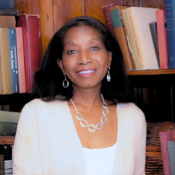 Lilly Marcelin
Lilly Marcelin
Lilly Marcelin is a community activist and organizer who has dedicated herself to a lifelong journey around racial and social justice equity. Ms. Marcelin has worked on a broad range of issues from gender-based violence, human trafficking, health and socioeconomic disparities to women’s reproductive health and rights. She is the Founder and Executive Director of the Resilient Sisterhood Project (RSP) with a mission to inform and empower women and young adults of African descent about the common diseases of the reproductive system that disproportionately affect them. Ms. Marcelin strongly prefers to work in partnership with–rather than on behalf of–black women to address deeply rooted systemic racism. Ms. Marcelin holds educational degrees from Wellesley College and Tufts University. In addition, she has been the recipient of many awards over the years with the most recent ones in 2023.
